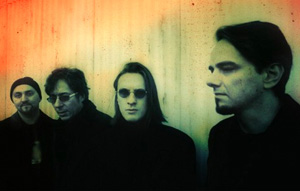Anwyn Crawford discusses live music review techniques
Owing to both arrogance and pride, it took me a while to realise that as a music critic, constructive criticism from your peers should be welcomed. I get it now, which is why I was thrilled to receive an email from Anwyn Crawford in response to my Porcupine Tree review earlier in the week.
“I have some thoughts on your recently linked-to live review,” she wrote, “if you’ll permit me to share them with you.”
Of course.
Anwyn is an Australian music critic based in Brooklyn. Her words have appeared in The Age, Loops, The Wire, Mess+Noise and Cyclic Defrost; contributions to the latter two are under the pen name Emmy Hennings. You should read her Overland opinion piece on Nick Cave, entitled ‘The Monarch Of Middlebrow‘.
Anwyn doesn’t consider herself as a freelance writer, because in her own words, “I probably only publish about three articles a year”. That said: she knows her shit. I’m holding her advice on par with what Andrew Ramadge told me last year.
The topic of discussion – my Porcupine Tree review for The Vine – can be found here. You should read it before reading the below, which is an unedited copy of what was sent to me.
First up, it’s far too long. Unless you’re going to be deliberately discursive, or be pursuing a particular thesis about a cultural event that is significant to a lot of people, for instance Marcus’s review of The Tote’s last evening, then less than half that length is ample. Believe me, readers don’t want or need that much information in a live review format. I’m not saying this because I think it should be a “dumbed down” format or that readers aren’t capable of digesting something more complicated – they are – but it’s important to respect the expectations of the form that you’re working in, whatever that might be, which means that if you break the expectations for a particularly compelling reason, then the results will be more fruitful. Part of the skill of a live review, I think, is try and relay, in a reasonably short numbers of sentences, your experience of the performance to a readership. This means trying to pick representative moments of the performance – or occasionally unrepresentative moments, if these seem to get closer to the truth of the event. A song-by-song catalogue has little narrative interest for a reader.
Secondly, and this is my big beef with so much music writing – PUT YOURSELF IN IT. I know that the first rule of essay writing that we’re all taught at school is never to use the first person pronoun. It’s time to put that rule aside. Reviewing is an inherently subjective act. It’s your opinion, and your experience – own it. This doesn’t mean describe what you had for dinner and how your feet were sore and “Oh, I missed the opening band” (classic street press gaffe), it means: don’t let your writing be bloodless. A reader wants to know why the performance might have mattered (or not mattered) and the only way they’re going to be able to get a handle on that is if you tell them why it mattered to you. It will also, almost inevitably, make your sentences shorter and more energetic, because you can can avoid clunky constructions like “One expects” and its many bet-hedging variants. “I think” “I was ecstatic” “My brain was melting” “This has stayed with me for days” – don’t be afraid to say I.
Thirdly, avoid Latinate constructions and “pretentious diction”. I’m with George Orwell on this one. Translate them back into plain English. “Resultantly” = “As a result”. It doesn’t sound more sophisticated when you write “Resultantly”, it just confuses the meaning. Same goes for words like “emotive” (emotional) “reciprocate” (respond) “regale” (you need “shout” or something similar there, because “regale nonsense” as a clause makes no grammatical sense without a subject who is being regaled). Take a sentence like: “It’s a fittingly exhilarating close to an achingly beautiful song, into which the singer interjects a heartily-applauded full band introduction.” It took me about three runs to actually figure out what that meant. “It’s an exhilarating close to a beautiful song, and when singer XY pauses to introduce the band, he gets hearty applause”, is much clearer.
And lastly, also related to Orwell’s timeless advice, avoid cliches and ready-made phrases. Chords nearly always “flourish”. A band is too often on a “jaunt” when the writer doesn’t want to use the word “tour”. There are millions of basslines that “pulse” and countless pianos that sound “plaintive”. Find a more interesting and a more accurate word, if you can, but bear in the mind the above: don’t let it become pretentious. Verbs are your friend, adjectives are often not.
Just the kind of kick-up-arse I needed. Thanks, Anwyn. Pay attention to her blog.
 I want to discuss this review from a writing perspective. Some background is required.
I want to discuss this review from a writing perspective. Some background is required.